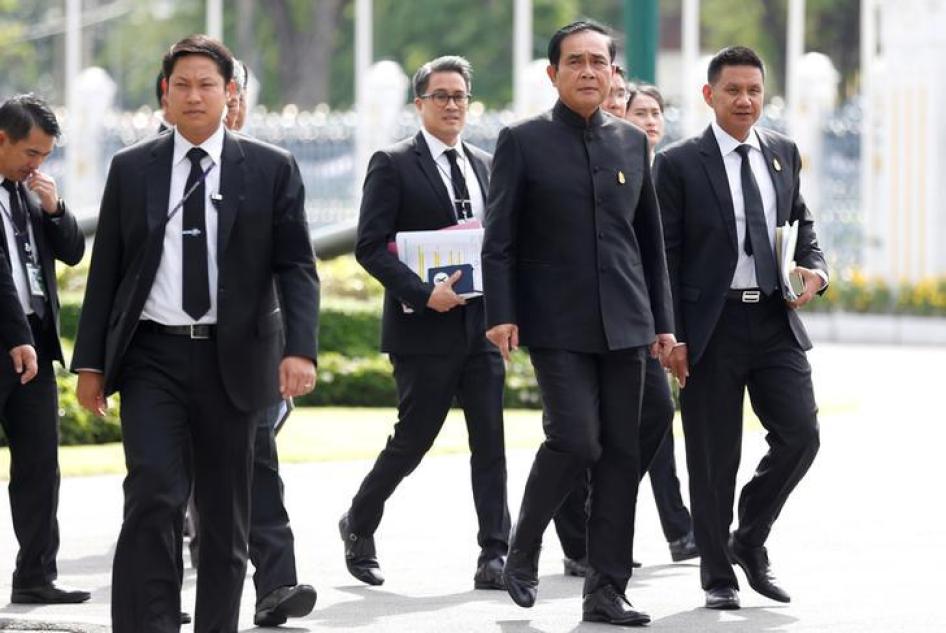On Monday, Oct. 2, Thailand’s prime minister, general Prayuth Chan-ocha, will tour Washington for an Oval Office meeting with president Donald Trump and several other meetings, including with Congressional leadership. Trump has already hosted authoritarian leaders from Egypt, Turkey, Vietnam, and Malaysia, and the visit comes on the heels of his United Nations General Assembly speech emphasizing “sovereignty,” a concept often used by dictators as a shield to international scrutiny.
No one should expect any substantial discussion about the deterioration in Thailand’s human rights situation since Prime Minister Prayut took power via a coup in 2014. The ugly political realities of the visit—that Thailand is ruled by a military junta and the Trump administration doesn’t care—will be papered over with repetitions of old tropes typically trotted out during US-Thailand diplomatic meetings: that Thailand is the United States’s “oldest ally in Asia”; that the relationship is the product of a diplomatic “friendship” forged in 1833. Both sides will praise the nations’ “enduring” ties. Someone may even recount the old chestnut about King Mongkut offering to send war elephants to President Abraham Lincoln at the start of the US Civil War.
There is nothing for Thailand or the US to celebrate these days. The Trump administration has shown near-complete apathy toward human rights and the rule of law abroad, and the president has embraced increasingly discriminatory, rights-violating policies at home. Trump praises autocratic leaders the world over with little comment on their abuses. He has been contemptuous of institutions and processes at the heart of US democracy. He has railed against the media, been dismissive of courts, and ignored values of equality that are central to a pluralistic, rights-based democracy.
Thailand, for its part, has been going from bad to worse. The military-controlled government has detained thousands of people for criticizing the government, the military, or the monarchy—even for parodies and satire. More than 1,400 civilians await trial in military courts for refusing to obey the junta’s orders that violate freedom of expression and assembly. The government prohibits assemblies of more than five people. A junta-sponsored constitution protects junta members from accountability for abuses. Thailand’s once lively environment for the media and public debate has been battered into silence.
The junta’s promises to hold elections and restore democracy have repeatedly been broken by constantly sliding deadlines. There are no indications that any election would occur in a free and fair atmosphere. In Aug. 2016, the junta organized a constitutional referendum under severe restrictions on freedom of expression, and dozens of activists are now in the courts, facing long prison sentences for advocating a “no” vote. Under the new constitution, an election would at best produce a pseudo-democracy, with a junta-appointed senate quite possibly becoming the largest political force in the parliament, holding a direct role in selecting the prime minister—meaning the military could essentially select any new “democratic leader.”
In response to the May 2014 coup, the Obama administration criticized the military’s seizure of power and cut bilateral assistance and military training, as required by the US Foreign Assistance Act, which prohibits most direct forms of assistance to governments that have overthrown a duly elected government.
Despite some tough statements and imposing the “coup clause” cuts, the Pentagon has begun to reboot its engagement with Thailand, even as other assistance remains banned. Last fall, the Pentagon began pressing to restore US troop participation in Cobra Gold military exercises to pre-coup levels, and to allow high-level visits to Thailand by US military commanders. Notably, the Pentagon announced the top commander in the US Pacific Command, Admiral Harry Harris, would visit Thailand for the Feb. 2017 Cobra Gold exercise.
This is the heart of the problem: the Pentagon is increasingly steering US policy toward Thailand, while the White House’s main concerns are about a US trade deficit with the country. An approach that focuses narrowly on shared interests is shortsighted and ignores the fact that rights-respecting governments are better allies than abusive ones.
Members of the US Congress, many of whom care deeply about a foreign policy approach that incorporates human rights, need to get in the game. They should demand that the Trump administration not give the junta a free pass. They should publicly reaffirm that US law bars direct military assistance to Thailand and outline key benchmarks Thailand needs to meet to restore the bilateral relationship to its prior condition.
Benchmarks should include the junta rescinding key orders that restrict free speech and assembly, dropping charges against people for peacefully exercising their civil and political rights, releasing a plausible timeline for holding free and fair elections, and establishing concrete steps to meet that timeline, including allowing political parties to campaign freely. The message to the junta should be that the US government cannot maintain engagement until Thailand takes steps in good faith toward meeting its commitments.
Since Trump and his State Department are unlikely to deliver the message to Prayut or tell the Pentagon to cool their engagement with the junta, Congress needs to step up to the plate. After all, they still control the purse and write the laws.







